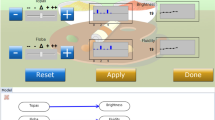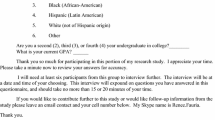Abstract
The successful completion of a university degree program is accompanied by multiple complex opportunities and challenges, which require students to react accordingly with the skills necessary to meet them. Therefore, the aim of this study was to investigate the role of complex-problem solving (CPS) skills in undergraduate students’ university success in two independent samples. In Study 1, 165 university students completed a measure of intelligence as well as a measure of CPS. In addition, students’ university grade point averages (GPAs) and their subjective evaluation of academic success were collected. CPS made a significant contribution to the explanation of GPAs and the subjective success evaluations even when controlling for intelligence. To further investigate this effect, Study 2 relied on an independent and more heterogeneous sample of 216 university students. The findings of Study 1 were essentially replicated in Study 2. Thus, the combined results demonstrate a link between individual differences in CPS and the abilities necessary to be academically successful in university education.

Similar content being viewed by others
References
Arnett, J. J. (2000). Emerging adulthood: a theory of development from the late teens through the twenties. American Psychologist, 55, 469–480. https://doi.org/10.1037//0003-066X.55.5.469.
Bacon, D. R., & Bean, B. (2006). GPA in research studies: an invaluable but neglected opportunity. Journal of Marketing Education, 28, 35–42. https://doi.org/10.1177/0273475305284638.
Beauducel, A., & Wittmann, W. W. (2005). Simulation study on fit indexes in CFA based on data with slightly distorted simple structure. Structural Equation Modeling, 12, 41–75. https://doi.org/10.1207/s15328007sem1201_3.
Bloom, B. S. (Ed.). (1956). Taxonomy of educational objectives: Vol. 1. Cognitive domain. New York: McKay.
Duckworth, A. L., Weir, D., Tsukayama, E., & Kwok, D. (2012). Who does well in life? Conscientious adults excel in both objective and subjective success. Frontiers in Psychology, 356, 1–8. https://doi.org/10.3389/fpsyg.2012.00356.
Ferrett, S. (2000). Peak performance: Success in college and beyond. New York: Glencoe/McGraw-Hill.
Formazin, M., Schroeders, U., Koeller, O., Wilhelm, O., & Westmeyer, H. (2011). Studierendenauswahl im Fach Psychologie. Testentwicklung und Validitätsbefunde student selection for psychology. Test development and predictive validity. Psychologische Rundschau, 62, 221–236.
Frensch, P. A., & Funke, J. (Eds.). (1995). Complex problem solving: the European perspective. Hillsdale: Erlbaum.
Funke, J. (2001). Dynamic systems as tools for analysing human judgement. Thinking & Reasoning, 7, 69–89. https://doi.org/10.1080/13546780042000046.
Funke, J., & Frensch, P. A. (2007). Complex problem solving: the European perspective—10 years after. In D. H. Jonassen (Ed.), Learning to solve complex scientific problems (pp. 25–47). New York: Lawrence Erlbaum.
Furnham, A., Chamorro-Premuzic, T., & McDougall, F. (2003). Personality, cognitive ability, and beliefs about intelligence as predictors of academic performance. Learning and Individual Differences, 14, 47–64. https://doi.org/10.1016/j.lindif.2003.08.002.
Gattiker, U. E., & Larwood, L. (1986). Subjective career success: a study of managers and support personnel. Journal of Business and Psychology, 1, 78–94.
Greiff, S., & Neubert, J. C. (2014). On the relation of complex problem solving, personality, fluid intelligence, and academic achievement. Learning and Individual Differences, 36, 37–48. https://doi.org/10.1016/j.lindif.2014.08.003.
Greiff, S., Wüstenberg, S., & Funke, J. (2012). Dynamic problem solving: a new assessment perspective. Applied Psychological Measurement, 36, 189–213. https://doi.org/10.1177/0146621612439620.
Greiff, S., Wüstenberg, S., Molnár, G., Fischer, A., Funke, J., & Csapó, B. (2013). Complex problem solving in educational contexts—Something beyond g: concept, assessment, measurement invariance, and construct validity. Journal of Educational Psychology, 105, 364–379. https://doi.org/10.1037/a0031856.
Greiff, S., Stadler, M., Sonnleitner, P., Wolff, C., & Martin, R. (2015a). Sometimes less is more: comparing the validity of complex problem solving measures. Intelligence, 50, 100–113. https://doi.org/10.1016/j.intell.2015.02.007.
Greiff, S., Fischer, A., Stadler, M., & Wüstenberg, S. (2015b). Assessing complex problem-solving skills with multiple complex systems. Thinking & Reasoning, 21, 356–382. https://doi.org/10.1080/13546783.2014.989263.
Harackiewicz, J. M., Barron, K. E., Tauer, J. M., & Elliot, A. J. (2002). Predicting success in college: a longitudinal study of achievement goals and ability measures as predictors of interest and performance from freshman year through graduation. Journal of Educational Psychology, 94, 562–575. https://doi.org/10.1037/0022-0663.94.3.562.
Hell, B., & Schuler, H. (2005). Verfahren der Studierendenauswahl aus Sicht der Bewerber. [Methods of university student selection from the applicants’ view]. Empirische Pädagogik, 19(4), 361–376.
Hell, B., Trapmann, S., & Schuler, H. (2007). Eine Metaanalyse der Validität von fachspezifischen Studierfähigkeitstests im deutschsprachigen Raum [A meta-analytic investigation of subject-specific admission tests in the German-speaking countries]. Empirische Pädagogik, 21, 251–270.
Hu, L. T., & Bentler, P. M. (1999). Cutoff criteria for fit indexes in covariance structure analysis: conventional criteria versus new alternatives. Structural Equation Modeling, 6, 1–55. https://doi.org/10.1080/10705519909540118.
Huang, F. L. (2016). Alternatives to multilevel modeling for the analysis of clustered data. The Journal of Experimental Education, 84, 175–196. https://doi.org/10.1080/00220973.2014.952397.
Hughes, E. C. (1959). Men and their work. American Journal of Sociology, 65(1), 115–117.
Jensen, A. (1998). The g factor: the science of mental ability. Westport: Praeger.
Johnson, V. E. (2003). Grade inflation: A crisis in college education. New York: Springer.
Kretzschmar, A., Neubert, J. C., Wüstenberg, S., & Greiff, S. (2016). Construct validity of complex problem solving: a comprehensive view on different facets of intelligence and school grades. Intelligence, 54, 55–69. https://doi.org/10.1016/j.intell.2015.11.004.
Kuncel, N. R., Hezlett, S. A., & Ones, D. S. (2001). A comprehensive meta-analysis of the predictive validity of the graduate record examinations: Implications for graduate student selection and performance. Psychological Bulletin, 127, 162–181. https://doi.org/10.1037/0022-3514.86.1.148.
Liepmann, D., Beauducel, A., Brocke, B., & Nettelnstroth, W. (2012). Intelligenz-Struktur-Test–screening—IST-screening [intelligence structure test–screening]. Göttingen: Hogrefe.
Lotz, C., Sparfeldt, J. R., & Greiff, S. (2016). Complex problem solving in educational contexts–still something beyond a “good g”? Intelligence, 59, 127–138. https://doi.org/10.1016/j.intell.2016.09.001.
Muthén, L. K., & Muthén, B. O. (1998–2015). Mplus user’s guide. Seventh Edition. Los Angeles: Muthén & Muthén.
OECD. (2014). Education at a glance 2014: OECD indicators. Paris: OECD Publishing. https://doi.org/10.1787/eag-2014-en.
Parker, J. D., Summerfeldt, L. J., Hogan, M. J., & Majeski, S. A. (2004). Emotional intelligence and academic success: examining the transition from high school to university. Personality and Individual Differences, 36, 163–172. https://doi.org/10.1016/S0191-8869(03)00076-X.
Pittman, L. D., & Richmond, A. (2008). University belonging, friendship quality, and psychological adjustment during the transition to college. The Journal of Experimental Education, 76, 343–362. https://doi.org/10.3200/JEXE.76.4.343-362.
Richardson, M., Abraham, C., & Bond, R. (2012). Psychological correlates of university students’ academic performance: a systematic review and meta-analysis. Psychological Bulletin, 138, 353–387. https://doi.org/10.1037/a0026838.
Robbins, S. B., Lauver, K., Le, H., Davis, D., Langley, R., & Carlstrom, A. (2004). Do psychosocial and study skill factors predict college outcomes? A meta-analysis. Psychological Bulletin, 130, 261–288. https://doi.org/10.1037/0033-2909.130.2.261.
Robbins, S. B., Allen, J., Casillas, A., Peterson, C. H., & Le, H. (2006). Unraveling the differential effects of motivational and skills, social, and self-management measures from traditional predictors of college outcomes. Journal of Educational Psychology, 98, 598–616. https://doi.org/10.1037/0022-0663.98.3.598.
Sonnleitner, P., Brunner, M., Greiff, S., Funke, J., Keller, U., Martin, R., et al. (2012). The genetics lab. Acceptance and psychometric characteristics of a computer-based microworld to assess complex problem solving. Psychological Test and Assessment Modeling, 54, 54–72.
Stadler, M. J., Becker, N., Greiff, S., & Spinath, F. M. (2015a). The complex route to success: complex problem-solving skills in the prediction of university success. Higher Education Research & Development, 35, 1–15. https://doi.org/10.1080/07294360.2015.1087387.
Stadler, M., Becker, N., Gödker, M., Leutner, D., & Greiff, S. (2015b). Complex problem solving and intelligence: a meta-analysis. Intelligence, 53, 92–101. https://doi.org/10.1016/j.intell.2015.09.005.
Sternberg, R. J., & Berg, C. A. (1986). Quantitative integration. Definition of intelligence: a comparison of the 1921 and 1986 symposia. In R. J. Sternberg & D. K. Detterman (Eds.), What is intelligence? (pp. 155–162). Norwood: Ablex.
Strenze, T. (2007). Intelligence and socioeconomic success: a meta-analytic review of longitudinal research. Intelligence, 35, 401–426. https://doi.org/10.1016/j.intell.2006.09.004.
Tavernier, R., & Willoughby, T. (2014). Bidirectional associations between sleep (quality and duration) and psychosocial functioning across the university years. Developmental Psychology, 50, 674–682. https://doi.org/10.1037/a0034258.
Terenzini, P. T., Rendon, L. I., Upcraft, M. L., Millar, S. B., Allison, K. W., Gregg, P. L., & Jalomo, R. (1994). The transition to college: diverse students, diverse stories. Research in Higher Education, 35, 57–73. https://doi.org/10.1007/BF02496662.
Wagener, D. (2001). Psychologische Diagnostik mit komplexen Szenarios [Psychological diagnostics using complex scenarios]. Lengerich: Pabst.
Wirth, J., & Klieme, E. (2003). Computer-based assessment of problem solving competence. Assessment in Education: Principles, Policy, & Practice, 10, 329–345. https://doi.org/10.1080/0969594032000148172.
Wüstenberg, S., Greiff, S., & Funke, J. (2012). Complex problem solving–more than reasoning? Intelligence, 40, 1–14. https://doi.org/10.1016/j.intell.2011.11.003.
Funding
This research was funded by grants of the Fonds National de la Recherche Luxembourg (ATTRACT “ASKI21”; AFR “COPUS”).
The contribution of the third author was supported by the German funds “Bund-Länder-Programm für bessere Studienbedingungen und mehr Qualität in der Lehre (‘Qualitätspakt Lehre’)” [the joint program of the federal government and states for better study conditions and the quality of teaching in higher education (“the Teaching Quality Pact”)] at Saarland University (funding code 01PL11012). The concept and content of this manuscript was developed by the authors independently of this funding.
Author information
Authors and Affiliations
Corresponding author
Rights and permissions
About this article
Cite this article
Stadler, M., Becker, N., Schult, J. et al. The logic of success: the relation between complex problem-solving skills and university achievement. High Educ 76, 1–15 (2018). https://doi.org/10.1007/s10734-017-0189-y
Published:
Issue Date:
DOI: https://doi.org/10.1007/s10734-017-0189-y




